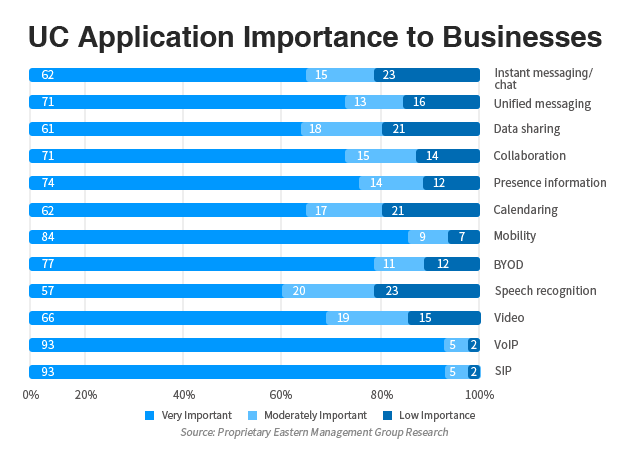
Hyperconnected. That’s what today’s businesses are heading for.
Unified communications is gaining popularity among SMBs. Below is a list of UC application importance for business, and you can have a glance at the major capabilities that today’s businesses are looking for from UC solutions.

One of the most efficient delivery models for UC is cloud computing. The benefits of running UC in the cloud, similar to those of other cloud-based solutions, include the ability to scale services up and down as needed, cost savings that are inherent with the cloud services, better and simpler mobility, and real-time access to communications systems and corporate data.
Here are 6 scenarios where the cloud-based unified communications solution enables transformative changes in an organization’s operations.
1. Multi-site Organizations
It can be difficult to keep communication aligned when handling multiple offices spreading out over different locations. The cost of maintaining equipment at each site. The problem of keeping a single business number. The issue with extension-dial among co-workers. Fortunately, cloud UC solutions eliminate these communication bottlenecks by allowing seamless call routing, simplified management, and a consistent inter-office communication experience. It unifies communication systems of all widespread geographically sites together so that different branches operate as part of a single system. And since the entire system runs from the cloud, the IT administrator can access and centrally manage it at any one single location.
2. Mobile Workers
Today’s workforce is increasingly agile. A large number of employees are not that“desktop-centric” as before and favor the mobile-first, easy-to-manage communications. Cloud unified communications is able to help them stay in sync across devices and locations. Whether your staff works remotely from home or on the go, having data stored in the cloud assures instant access to all the information they need at their fingertips. The one number reach conceals your personal phone number and ensures a unified corporate identity. You can also check missed calls, call history, voicemails, and one-touch recordings right on your mobile phones.
Related: 5 Major Reasons Why You Need a Mobile Softphone
3. In-office Communication
Effortless and transparent communication tools are great bolster for work efficiency. UC solutions enable employees to collaborate with one another in a variety of ways. Case in point, instant messaging. IM has become cost-effective and convenient assistance in real-time business communication. Instead of involving a third party application, the UC solution brings the IM feature with the same capability. You can reach colleagues by starting a chat and easily share files, faster than email responses, and particularly helpful when you are on the call at the moment. What’s more, unified messaging allows for instantaneous information exchange and improved organizational responsiveness; presence enables users to manage their availability and make better communication decisions. The list goes on. These features all eliminate fees for third-party applications.
4. Seasonal Businesses
Business needs to grow and shrink, especially for industries with busy seasons, such as retail, tourism, hospitality, and entertainment. Companies in such industry experience growing need for employees and communication resources during peak periods to keep up with the customer demand, and are confronted with the challenge of year-round cost control. This need reflects a key benefit of cloud-based UC solution, scalability. As most cloud services are charged on a per-user basis, a pay-as-you-grow OpEx pricing model of cloud UC solution enables these seasonal businesses to allocate costs more effectively. Moreover, as a cloud solution, you can add users, concurrent calls or services instantly with just a few clicks from the web interface. Besides seasonal business, companies with predictable growth patterns also benefit from this solution.
5. Short of IT Staff
Cloud unified communications saves both administrators and IT staff a great deal of time by taking their burden off and outsourcing the administration of the system to service providers, who are better qualified to manage it. Particularly, IT personnel at small to medium-sized businesses might not have the technical expertise or the time to take care of the system. Using a cloud-based unified communications solution enables them to concentrate on their core roles, improve efficiency and address operational challenges. Besides savings in IT resources, one of the biggest benefits with cloud UC solutions is reduced CapEx and OpEx. With a minimal initial investment, businesses can get enterprise-grade communication experience quickly right at their, which also reduces continuous upkeep.
6. Integration with Other Business Application
Most UC solutions can integrate with third-party business applications to deliver more robust capabilities and streamline business operation. For instance, CRM integration provides a pop-up of customers’ information when they call in, helping you quickly have a general idea of them before answering the ringing phone and provide personalized service and better customer experience. Call details will also be synchronized to the CRM systems to assist your lead management. Besides, effective CRM integration collects a wide range of vital statistics and data, allowing you to track the team’s activity and conduct in-depth analytics for sales success.
Related: 5 Key Advantages to VoIP CRM Integration
Yeastar Cloud-based UC Solution: Doubling Your Benefits
You can try it out right away by signing up Yeastar Cloud PBX free trial and using it in conjunction with Linkus UC Softphone which requires no extra charges. Linkus works on Android phones, iPhone, Windows and Mac desktop. Download it here.

